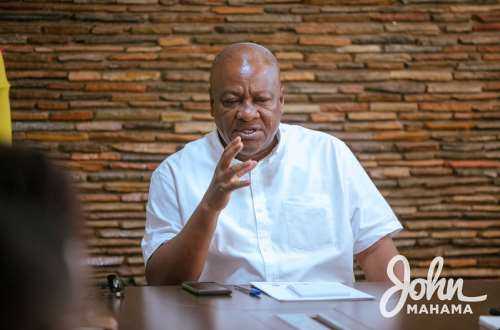Former President John Dramani Mahama has explained how Ghana can strike good agreements in the extractive sector.
At the moment, he said, the country is not getting good deals in the sector.
He wants the Ghana Geological Survey (GGS) to be resourced to ascertain the quantum of natural resources the country is endowed with.
He says that is the only means Ghana can strike better agreements with foreign industries who come down to mine the nation’s minerals, a cause he is ready to chart when elected President.
“They (Ghana Geological Survey) need to be given money to do exploration in the whole country to know the value of lithium we have in the country including all other natural resources the state has been endowed with. After that we can strike better bargaining deals with those who would want to mine them for us. That is how it is done in several countries and they benefit from their minerals.
“But here in Ghana, just 10 per cent with free carried interest. The royalties which the minerals and mining code says should be between 6 and 12 per cent has now been reduced to 3 per cent. So 10 per cent interest, 3 per cent royalties and 35 per cent corporate income tax is what we take and the miners take the rest to their home countries,” he bemoaned while speaking at Ayeldo in the Abura-Asebu Kwamankese district of the Central region as part of his ‘Building Ghana Tour.
Background
Government granted the nation’s first lithium mining lease to Barari DV Ghana Limited, a subsidiary of Atlantic Lithium Limited, to commence construction and mining operations in the Central region.
The 15-year lease incorporates enhanced terms intended to optimise Ghana’s earnings from its lithium resources. This includes a 10% royalty rate, increased state participation and requirements for domestic value addition.
Minister of Lands and Natural Resources, Samuel Abdulai Jinapor, during the agreement stated that the government decided lithium should not be treated the same as other minerals. As such, a special policy was developed and cabinet-approved before issuing the mining lease.
The Minister said the government recognises mining’s impacts and was committed to ensuring communities and Ghanaians benefit from the country’s mineral wealth. He urged the company to adhere to laws and conduct sustainable, environmentally responsible mining.
The new lithium policy raises the state’s free carried interest from 10% to 13%. Additionally, the government, through the Minerals Income Investment Fund, would acquire a further 6% of the mining operation and 3.06% of the parent company listed in Australia and London.
The company would also be mandated to list on the Ghana Stock Exchange for local investment participation and a stipulated 1% revenue payment into community development funds for impacted areas.
Significantly, the lease requires the company to construct a domestic chemical plant for lithium processing or supply any lithium mined to third-party processing plants in Ghana. This aims to foster job creation and local value addition.
The Ewoyaa deposit was discovered in 2017 and has high-grade lithium reserves. Lithium is a key mineral for lithium-ion batteries, replacing fossil fuels for global green energy transition.
Ghana is undertaking initiatives to derive maximum state revenue and local development benefits from its untapped lithium resources.
The enhanced lease represents efforts to strategically leverage the mineral for national progress


